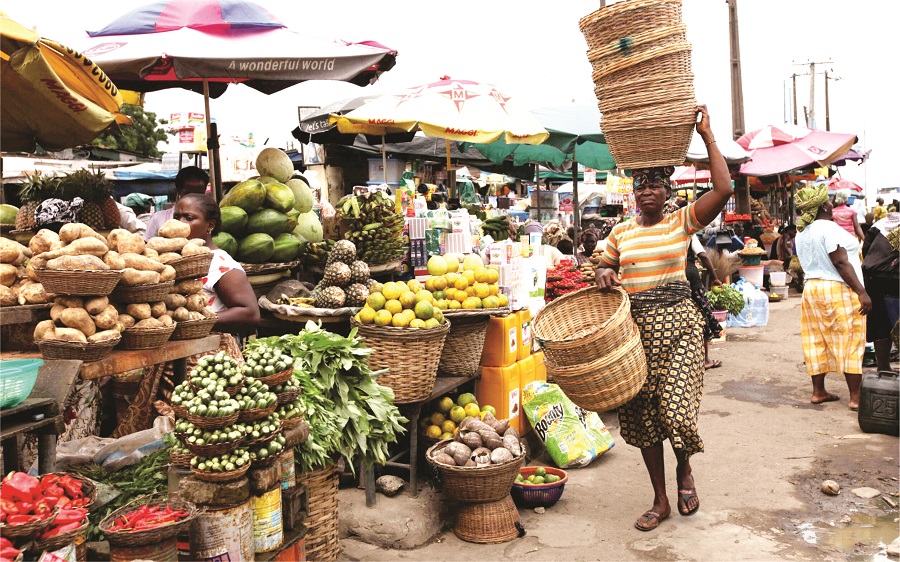Make food available, affordable
A recent report from the National Bureau of Statistics (NBS) indicates that Nigeria faces a possible food crisis in the not-so-distant future if urgent steps are not taken to address the situation. In the report released by the NBS, the food sub-index of the general inflationary was recorded at 30.64% in September this year which […]

A recent report from the National Bureau of Statistics (NBS) indicates that Nigeria faces a possible food crisis in the not-so-distant future if urgent steps are not taken to address the situation.
In the report released by the NBS, the food sub-index of the general inflationary was recorded at 30.64% in September this year which stands at almost 4% above the 26.72% recorded for the country in general. In comparison to the figures for September last year which stood at 23.34%, this represents an increase of 7.30% and this should worry all stakeholders.
The NBS report attributed the rise in food prices specifically to oil and fat, bread and cereals, potatoes, yams, fish, fruits, meat, vegetables, milk, cheese, and eggs.
The listed items constitute the main staple used in households.
Between the sisters-raping teacher of Gombe and the vulnerability of minors
With the removal of subsidy on petrol and devaluation of the naira which have led to an increase in the prices of food items, in the coming months, these items may not be available and even if they are, will be out of reach of many Nigerians. In the light of this development, the inevitable conclusion is that Nigeria is facing the challenge of food availability and affordability. With vast arable land, Nigeria should not be among the countries facing food challenges. But a combination of implementation failures by responsible agencies of government, growing insecurity, especially in Nigeria’s food-producing belt, climate change, a fast-growing population, and inflationary pressures are impacting negatively the food situation in the country. We are now dangerously sliding towards a situation of food insecurity in the country with the attendant effects of unavailability and unaffordability.
To his credit, President Bola Ahmed Tinubu has added food security to the responsibilities of the Ministry of Agriculture to read Ministry of Agriculture and Food Security. This means that in addition to assisting in providing the necessary inputs like fertiliser, seedlings, extension services, and mechanical implements like tractors and harvesters, the ministry will also be responsible for protecting farmers from bankruptcy, inflation, and other measures that increase and secure their yields. He also directed that all matters about food should be included within the purview of the National Security Council. But more has to be done for Nigerians to have food on their tables.
A concern that has continued to trouble Nigerians is the incidence of banditry and kidnapping in the food-producing areas of the country. It has been observed that bandits have laid siege to some of the farming communities; exacting levies on farmers and their families in cash and harvests. In some cases, these bandits have been known to drive off farmers from their land, confiscating and using the land for purposes such as camps for their nefarious activities.
This is a matter of urgent national importance that must be addressed immediately. We believe that food security, being a vital aspect of national security, a concerted action featuring the security and law enforcement arms of government at the local, state, and federal levels, is needed to address the situation.
Government must also address the issue of climate change manifested in several environmental factors like desertification, and flooding of farmlands in the hinterland and the coastal areas. Both factors have been known to affect farming communities resulting in the reduction of arable lands and destruction of farm yields and harvest. Desertification also results in migration, adding to pressure on lands and conflicts which ultimately affect food security.
With our ever-growing population, there is no gainsaying that government needs to be proactive in facing up to the present challenges in our agricultural sector to nip any future crisis in food supply in the bud. It is necessary to point out that a food crisis can lead to a social crisis. The president has in his broadcasts made pledges on how to boost agriculture. In fact, he directed the immediate release of fertilisers and grains to farmers and households to mitigate the effects of the subsidy removal, saying, “There must be an urgent synergy between the Ministry of Agriculture and the Ministry of Water Resources to ensure adequate irrigation of farmlands and to guarantee that food is produced all year round.” He also added that,
“We shall create and support a National Commodity Board that will review and continuously assess food prices as well as maintain a strategic food reserve that will be used as a price stabilisation mechanism for critical grains and other food items. Through this board, government will moderate spikes and dips in food prices.”
But after the announcement, not much has been seen in the area of implementation. Even the latest announcement lifting the ban on commodities for which forex can be accessed, which include food items such as rice, not much is known about its implementation and to what extent it will ameliorate the current situation. This issue must not be taken lightly as no country can develop with a hungry population. The president must walk his talk. The government must take urgent steps now towards making food available and affordable to the people.
